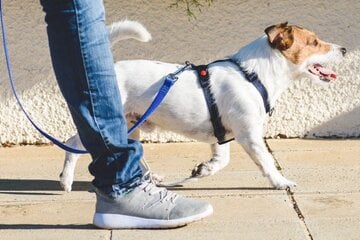Getting an office dog: Pros and cons and the friendliest dog breeds
More and more employers are getting onboard with employees taking their dogs into the office. You'll need a friendly dog, though, and to follow a few basic guidelines. Let's look at some tips and the friendliest office dogs that are sure to have your co-workers in puppy bliss, too.

It's true that dogs shouldn't be left home alone all the time, but not everyone has the luxury of being able to run home at lunchtime to take their pooch for a stroll.
Indeed, it would be far better to have a friendly office dog that you could take into work with you.
Plus, having a good-natured pup around will sure boost that office morale.
In this dog guide, TAG24 will take you through everything you need to consider when thinking about bringing your dog to work with you.
What are some friendly dog breeds, and what should you be aware of before asking your employer to bring your pup to work?
Here's how to get those tails wagging with office glee.
Don't have much time? Here's a quick TL;DR:
- Office dogs can actually improve the working atmosphere.
- You must always discuss things with your employer and manager before bringing a dog into the office.
- Your dog must be well-trained if you want to bring it to work with you.
What are the friendliest dog breeds for the office?
Working people often need to think about what breed of dog to get, but it's a bit different when they intend to bring the dog into the office with them on a regular basis. Their choice of pooch needs to be as non-disruptive and low-maintenance as possible, so that the dog doesn't cause a nuisance.
Instead of lively and hyperactive dog breeds, prospective pet owners should consider taking one of these breeds into the office:
- Golden Retriever
- Labrador Retriever
- Newfoundland
- Pug
- Bulldog
- Saint Bernard
- Chow-Chow
It is much better to choose a calm and good-natured dog breed if you intend on bringing your new pooch into the office.

What to consider when having a dog in the office
There are a ton of things you'll need to consider before taking your dog into the office.
If your boss agrees to the puppy addition, you'll also need to answer a few basic questions.
Here are the critical questions that need answering:
- Is there anyone at work who is allergic to animal hair?
- Are some of your colleagues afraid of dogs?
- Are there any health concerns that need to be addressed?
- Can you make your workplace more dog-friendly?
- How will you organize for your pooch to be walked at work?
- Will your dog be too distracting?
The next thing that you need to consider is, of course, whether your dog meets some very basic behavioral requirements. If your dog is too dirty, for example, then things aren't going to work out so well for you.
Here are some basic behavioral requirements for an office dog:
- Obedient and well-trained
- Well socialized with people
- Clean and toilet trained
- Quiet and calm
- Good physical and mental health
If your doggo can meet these few requirements, you are well on track to bringing a dog to work.
Office dog pros
If you pair a great dog with an accommodating and pleasant workplace, you will find that everyone around you will be made all the happier for it. Dogs make people happy, and petting is great for humans and canines alike. As a result, there are a ton of benefits that can come from having a dog at work each and every day.
Some of these office dog pros include:
- Dogs can increase the motivation and satisfaction of employees.
- Employees can benefit from a dog's stress-reducing effect.
- Dogs have been proven to improve brain-stimulation.
- Better cohesion can be formed between colleagues due to increased social contact and improved interpersonal relationships.
- It is healthy to take regular walks outside during the working day, to keep the body moving and the mind working.
Of course, taking your dog to work is also good for your faithful pooch. It isn't good for a four-legged friend to be left alone all day, and taking your dog to work may even help to reduce a dog anxiety.
Warning: You should never bring your dog into the office without prior arrangement and agreement with management.
Office dog cons
Nothing is perfect, and while it is fantastic to be able to bring your dog into work each and every day, there are a few disadvantages as well. A dog-friendly workplace doesn't work for every dog, every worker, and every employer – and here's why.
Some disadvantages of having an office dog include:
- Some co-workers may have allergies, and may even be scared of your friendly dog.
- Dogs can cause disruptions to people's workflow, as well as regular distractions due to how gosh-darn adorable they are.
- If a dog gets scared or frightened, it can lash out. In the case that it accidentally hurts somebody, there can be legal implications.
- You need a lot of time to look after a dog properly, especially one who is in a new environment, which could reduce efficiency.
Having your dog come into work every day can also harm the dog, especially if the office environment has not been dog-proofed properly.
How to get your office dog settled in
Before you can actively take your dog into work each day, you need to get it settled in, comfortable, and used to being in the office. This will take some time, but is crucial to making sure that your doggo is well-behaved and won't cause any problems in the workplace.
Let's take you through how to get your friendly dog settled into the office.

Office dogs need time to settle
You shouldn't just jump right-on into bringing your dog to work all day, every day. Your faithful pooch needs some time to acclimate, so you should start off slow.
That means taking your dog into work for a few hours, and then taking it home. Do this for a while, until your dog is clearly comfortable in the office space.
Your office dog should have its own space
You need to make sure that your dog has its own space, and somewhere to sleep, in the office. This spot should be equipped with a blanket or basket, a toy to cuddle up with, and a food and water bowl that is stocked and refilled regularly.
Offer variety to your office dog
Working days can be very long, especially for a dog who doesn't really have much to do. It's therefore important to provide variety for your four-pawed friend. Use your short work breaks to keep your dog occupied: taking it for walks, giving it some cuddles, and keeping its food filled. It's about keeping your dog happy and friendly, both for the pooch's well-being, and for the well-being of your co-workers.
Organize walks for an office dog
You need to organize for the office dog to be walked a couple of times a day, and your co-workers can and might even want to help.
That may mean organizing everyone's lunch breaks around the dog's needs, so that multiple people can take it on multiple walks throughout the day. In addition, more extensive walks and attention should be provided to a pooch both before and after work.
Important: Even if your workplace has been dog-proofed, you should make sure that the dog is always supervised by someone in the office. You don't want your dog to get hurt or get into trouble.

Tip: Only take a non-destructive, friendly office dog into work
Bringing your dog into work can be more than just a relief, but actually provide true joy. These playful pooches can enrich a workplace, developing fantastic relationships between owners and their faithful doggos and fostering great friendships between coworkers.
All that's needed are these few tips to remember, such as safety measures and designated walk times. Of course, your boss is going to need to agree as well, but if you vault your way over that hurdle, then you're in for a new-and-improved office life.
Cover photo: 123RF / Lightfieldstudios




